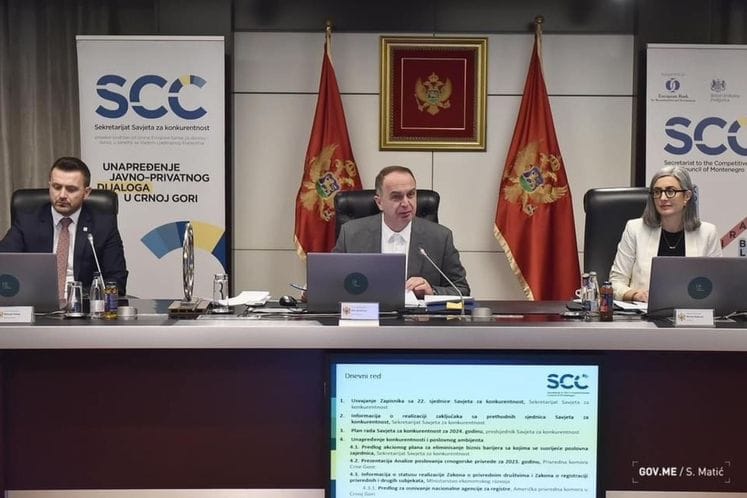- Government of Montenegro
Competitiveness Council holds its 23rd session
Competitiveness Council holds its 23rd session

At the 23rd session of the Competitiveness Council, chaired by Deputy Prime Minister for Economic Policy and Minister of Economic Development Nik Gjeloshaj, the Work Plan of the Competitiveness Council for 2024 was adopted. The main theme of the session was the enhancement of competitiveness and the business environment. The Work Plan envisages holding four regular sessions with the following main topics: enhancement of competitiveness and the business environment; key regulations for the business environment; combating the informal economy; and digital transformation.
During the session, discussions were held on various topics related to economic development and business operations. These included the status of laws governing business entities and registration procedures, initiatives aimed at enhancing economic competitiveness, mentoring programmes, and the implementation of industrial policies. Additionally, proposals were presented regarding the elimination of business barriers, analysis of business performance in Montenegro for 2023, the establishment of a national registry agency, gender analysis of programmes for enhancing economic competitiveness, challenges in implementing new anti-money laundering and counter-terrorism financing laws, and solutions to liquidity problems faced by young entrepreneurs.
The next session is planned for the second quarter, during June. In accordance with the conclusion of the Council, the Action Plan for Removing Business Barriers faced by the business community was adopted. The Secretariat of the Competitiveness Council prepared the Action Plan, which contains 11 key barriers identified as concrete tasks. Through 37 individual activities, efforts will be made to fulfill them within the assigned short-term (by the end of 2025) or medium-term frameworks (by the end of 2026). The implementation of this document will be monitored at all subsequent sessions of the Council.
The session was characterized by constructive discussion with active participation from representatives of both the private and public sectors, which is an important segment of dialogue and implementation of the Council's conclusions.
The Deputy Prime Minister and Minister of Economic Development emphasised the importance of supporting development projects to further enhance the competitiveness of Montenegro's economy and strengthen domestic production towards creating added value and enhancing the export potential of domestic businesses.

